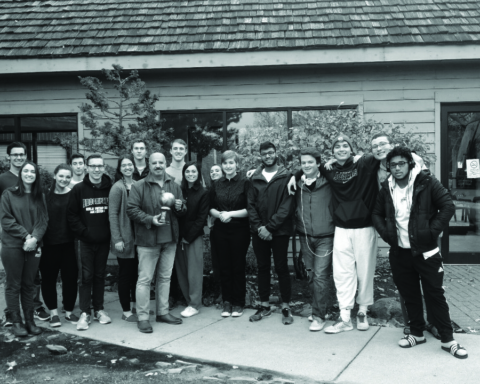By Philosophy Club members
Perhaps one day, like Neo, we’ll end up discovering we’re actually in pods being fed sensations from machines. We might “see” that woman in the red dress or cringe as we “bite” a Popsicle stick between front teeth, but these sensations and the supposed world they construct could be false. I hope not. But though we may not believe it, we have a hard time fully disproving this scenario.
In philosophy, the Matrix fits the “brain in a vat” thought experiment. This thought experiment poses a hypothetical situation in which we are simply brains in vats being fed stimuli that give false experiences. We experience embodied lives in the world, but really, we are just brain, vat and artificial stimuli.
A different reality, indeed.
Many philosophers have critiqued this thought experiment, notably Hilary Putnam, but raising it still forces us to examine the “subjective” and the “objective.” In doing this, we may illuminate a unique paradox about our human condition.
We often use the words “subjective” and “objective” to evaluate facts or opinions. Someone may want more “objective” news or “objective” data, or say that an opinion about the Detroit Lions is “subjective.” In a loose sense, we tend to associate “objective” things with truth and accuracy and “subjective” things with impressions or thoughts.
At a deeper level, however, this distinction touches on our brain in the vat: our “subjective” experience may differ from “objective” circumstances. In the thought experiment, for example, our subjective experience may be walking down the street eating cotton candy as a sleepy-eyed sheepdog struts beside us. But our objective circumstance is that we are a brain in a vat.
On the one extreme, one might argue, no objective reality exists. Everything is just our subjective experience. This is similar to philosopher George Berkeley’s “subjective idealism” the 18th century: everything is mental experience, and nothing physical or “material” exists.
On the other extreme, only the objective and material exists. In this view, mind is essentially illusory, and everything can be explained at the physical level as a networking of neurons, stimuli, chemicals or subatomic particles.
But most of us fall somewhere in the middle. Physical things may inform the world, we say, but we each have a unique subjective experience of that physical world.
Take a sunset, for example. It is a physical event happening out in the world, verified by different people, measured by machines and understood through physical laws. It is objective. But it may also present different experiences for each person. An artist, a scientist, a color-blind adult or a love-sick teenager experiences a different sunset. One objective sunset, then, creates billions of subjective ones.
And this paradox, perhaps, is an upshot of this whole brain-in-the-vat dilemma. More negatively, we have a hard time getting outside our heads, meaning we are always alien and other with ourselves and the physical world we share. Unless we can invent mind-melding techniques or drift-compatible Jaegers, we can never know one another’s experience. Also, all our so-called facts filter through a sieve of perception and cognition, dyed with the inevitable taint of in-born biases and imperfect comprehension.
But in a more optimistic view, consider the cascaded experiences that infuse every moment. Consider, for instance, a music concert. As the chords ripple in the crowded room, their wavelengths rasped by claps and shouts, each person lives in a different world and constructs a different memory. Thinking of this, we may acquire a certain sensitivity for the patched, dappled and imperfect “realities” we each form and the joint landscapes we all share.
Or maybe we’re all just brains in jar.
What do you think? Send answers or questions to SBUPhilosophy@gmail.com for our next column. Or, if you want to talk more at length, feel free to stop by our meetings. You can use the same e-mail to ask to be put on our mailing list.
SBUPhilosophyClub@gmail.com








